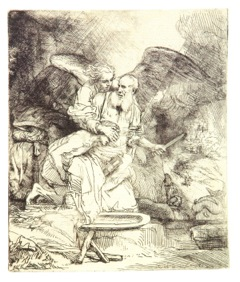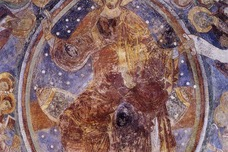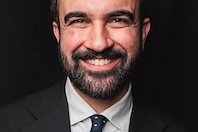Sunday Reflection with Fr Robin Gibbons - 25 February 2018

Second Sunday of Lent
How can one reconcile two seemingly very different texts? Do we even bother to try? I'm thinking of the readings from Genesis 22 about the Akedah, the Binding of Isaac by Abraham on Mount Moriah and Marks account (Mark 9) of Jesus being transfigured on a high mountain. I suppose the common denominator is a mountain. Both are up on high, both encounter the presence of the Divine in the form of a message, the difference being of course, that Jesus is also revealed in brilliant light as part of that Divine Life! Is there anything else? Well let's think and pray these stories through.
I expect some of you reading this may find the story of Abraham and his potential sacrifice of his son Isaac incomprehensible, you are not alone, I find it an incredibly difficult story and no amount of intellectual contortions can totally satisfy my understanding of a God who is basically love, demanding this sacrifice because this goes against everything we hold dear. Yet it's there in Christianity, we talk about Christ's self offering, his free gift of redemptive death on the cross, but underneath our piety and theological talk is still a nagging thought: 'why did it have to be this way, what Father desires the gift of his sons death?'
I may not have a total answer to these two issues, but I believe I have discovered a way that at least helps me and I shall share it with you. It is hinted at in the Divine words to Abraham, not perhaps ones you might have thought the most obvious (and for some reason omitted in our reading today), when after the Ram is sacrificed: 'Abraham named that place Yahweh-yireh; hence people today say, "On the mountain the LORD will provide'. (Gen 22:14)
Yahweh-yireh is a Hebrew expression meaning "the Lord will see/provide'.
In the brilliant encounter witnessed by the three disciples a voice is heard to say: 'This is my beloved Son. Listen to him.' (Mk 9:7)
When Abraham goes up the mountain, filled with fear and dread, no doubt at the end of his faith tether, he answers Isaac when asked where the sheep for the offering are: 'My son," Abraham answered, "God will provide the sheep for the burnt offering." Then the two walked on together'. (Gen 22:9) It is that faith that counts, God will provide. Even then Abraham goes beyond mere emotional or intellectual faith to what we all have to do, especially at that moment of death, he trusts God and in the end he is justified!
It is the same in that wonderful encounter with the glory, shekinah of Jesus in the Transfiguration, only here the disciples get a sign, a voice, an encounter that says, 'trust me'.
That for me is the link between our readings, a call to go beyond the safe, the known, the intellectual risking our very selves and jump into the arms of God, beyond all barriers and to find that in the end all is ultimately God's loving gift, all will make sense and what we will find is glory of love! God sees, and God will provide: Yahweh-yireh! We have it summed up in a phrase from Philippians: 'And my God will meet all your needs according to the riches of his glory in Christ Jesus'. (Phil 4:19) God in Christ sees all and in his death provides for us life in that light which is the resurrection, that glorious love which never ends!
Lectio Divina
Discussion between Joseph Campbell and Martin Buber regarding the sacrifice of Abraham
Joseph Campbell, the famous American anthropologist and mythology scholar, listening to the Jewish and zionist religious scholar Martin Buber who was talking about Phoenicians and what terrible criminals they were in sacrificing their elder sons to Moloch. About fifteen minutes later, he comes to Abraham about to sacrifice Isaac. Dr Campbell addresses the speaker: "Dr Buber, how do you distinguish between the divine and diabolical invitation ?" Dr Buber inquired : " What do you mean by that ?" Dr Campbell explained : " Well some fifteen minutes earlier, you were excoriating the Phoenicians for killing their oldest sons and now you 're celebrating Abraham for having been about to do the same thing with his oldest son. So, what is the answer ?" Dr Buber said : "The answer is 'We' with a capital W - We believe that God spoke to Abraham". That was the only answer Dr Campbell received regarding this matter.
Merton's famous revelation described in Conjectures of a Guilty Bystander
"In Louisville, at the corner of Fourth and Walnut, in the center of the shopping district, I was suddenly overwhelmed with the realization that I loved all those people, that they were mine and I theirs, that we could not be alien to one another even though we were total strangers. It was like waking from a dream of separateness, of spurious self-isolation in a special world, the world of renunciation and supposed holiness… This sense of liberation from an illusory difference was such a relief and such a joy to me that I almost laughed out loud… I have the immense joy of being man, a member of a race in which God Himself became incarnate. As if the sorrows and stupidities of the human condition could overwhelm me, now I realize what we all are. And if only everybody could realize this! But it cannot be explained. There is no way of telling people that they are all walking around shining like the sun."


















